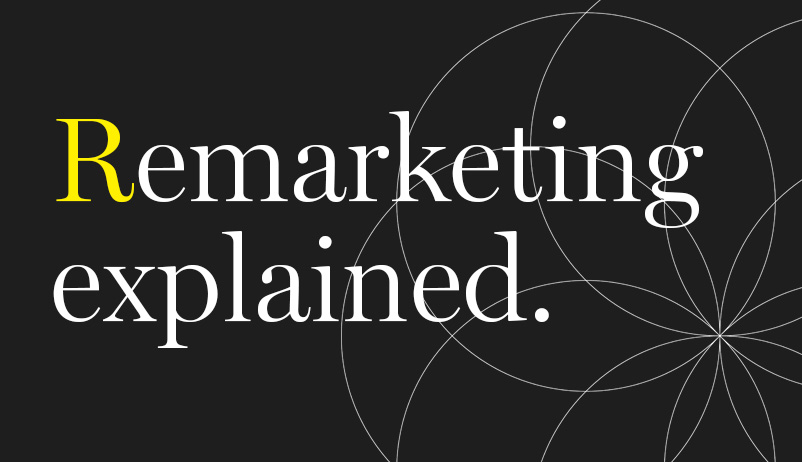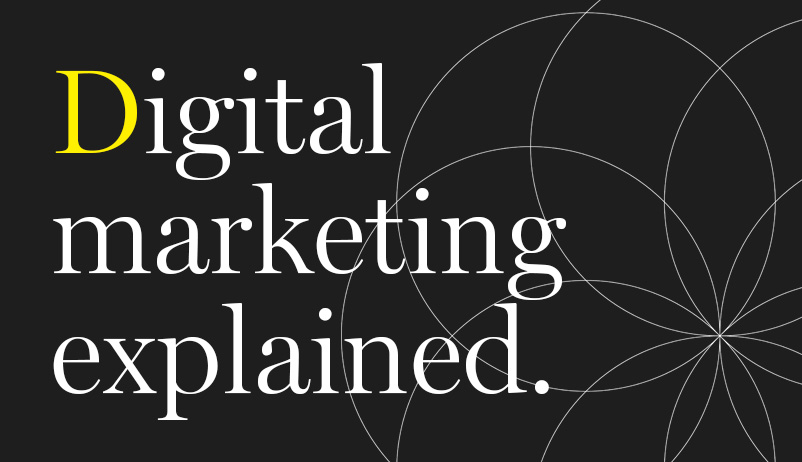

Remarketing
Remarketing
What Is Remarketing?
Lorem ipsum dolor sit amet, consectetur adipiscing elit. Suspendisse varius enim in eros elementum tristique. Duis cursus, mi quis viverra ornare, eros dolor interdum nulla, ut commodo diam libero vitae erat. Aenean faucibus nibh et justo cursus id rutrum lorem imperdiet. Nunc ut sem vitae risus tristique posuere.
What Does Remarketing Mean in Marketing?
In marketing, the term Remarketing, also known as retargeting, is a digital advertising strategy used by businesses to target potential customers who have previously interacted with their website, app or other digital channels. This technique works by serving ads to individuals who have already engaged with a brand but have not yet completed a desired action such as making a purchase or filling out a lead form.
What Is The Difference Between Remarketing And Retargeting?
In the context of online marketing, the terms "remarketing" and "retargeting" are often used interchangeably and refer to the same marketing strategy. However, in some contexts, "remarketing" is more commonly associated with Google Ads, which uses this term to refer to its advertising feature that allows advertisers to show targeted ads to users who have previously visited their website or engaged with their ads.
On the other hand, "retargeting" is often used more broadly to refer to similar strategies implemented on other advertising platforms or using other tracking technologies.
In essence, both remarketing and retargeting share the same underlying concept of targeting and re-engaging users who have previously shown interest in a brand or its offerings but did not convert, and the distinction between the two terms can vary depending on the specific marketing platform or context in which they are used.
How Does Remarketing Work?
Remarketing typically works by using tracking technologies, such as cookies, to collect data on users' behaviour and interests, and then serving targeted ads to them across various online platforms or channels, with the aim of re-engaging them and encouraging them to convert.
Here's a general overview of how remarketing works:
- Tracking: A tracking technology, such as a cookie or a pixel, is placed on the website or landing page that users visit, allowing the brand or advertiser to collect data on users' behaviour, such as pages viewed, products searched, or items added to the shopping cart.
- Segmentation: Based on the data collected, users are segmented into different groups or audiences, depending on their behaviour, interests, or other criteria, such as those who abandoned their shopping cart, visited a specific product page, or spent a certain amount of time on the website.
- Ad Creation: Customised ads are created for each audience segment, with the aim of addressing their specific interests or needs, and encouraging them to revisit the website or take the desired action.
- Ad Campaign: The customised ads are then served to the targeted audience across various online platforms or channels, such as Google Ads, social media platforms, or other display advertising networks, as users browse the internet or use apps.
- Optimisation: The remarketing campaign is monitored and optimized based on performance data, such as click-through rates, conversion rates, or return on investment (ROI), with adjustments made to ad creatives, targeting, or bidding strategies to improve campaign effectiveness.
Remarketing can be a powerful strategy to re-engage users who have shown interest in a brand or its offerings but did not convert, and can help drive higher conversion rates and ROI compared to traditional advertising methods. However, it's important to adhere to privacy regulations and best practices, such as obtaining proper consent for tracking and data collection, and providing users with opt-out options to ensure compliance and protect user privacy.

"Remarketing, or retargeting, is a digital advertising strategy that targets potential customers who have previously interacted with a brand, increasing conversion rates and brand recall through personalised messaging. However, marketers should address ad fatigue, privacy concerns, and potential negative perceptions when using this tactic."
Paul Mills
Founder, VCMO
What Are Examples Of Remarketing Campaigns?
There are several examples of remarketing campaigns that can be implemented across various industries and platforms. Some common examples of remarketing campaigns include:
- E-commerce Remarketing: A common remarketing campaign for e-commerce businesses is to target users who have visited a product page, added items to their shopping cart, or initiated the checkout process but did not complete the purchase. Ads can be tailored to showcase the specific products or offers that the user has shown interest in, with the goal of encouraging them to complete the purchase.
- Content Remarketing: Publishers or content creators can implement remarketing campaigns to target users who have visited their website, read specific articles, or engaged with certain types of content. Ads can be customized to promote related content, subscriptions, or other relevant offers, with the aim of increasing user engagement and loyalty.
- Lead Generation Remarketing: B2B marketers can use remarketing campaigns to target users who have visited their website, downloaded content, or filled out a form but did not convert into leads. Ads can be designed to promote additional gated content, webinars, or other lead generation offers, with the goal of nurturing these leads and driving them towards conversion.
- Abandoned Cart Remarketing: This remarketing campaign specifically targets users who have added items to their shopping cart but did not complete the purchase. Ads can be customised to remind users of the items in their cart, offer discounts, or provide incentives to complete the purchase.
- Cross-Sell/Up-Sell Remarketing: Remarketing can also be used to target existing customers with cross-selling or up-selling offers based on their previous purchases or browsing behaviour. Ads can be tailored to showcase related products or upgrades, with the aim of increasing the average transaction value and customer lifetime value.
- App Install/Activation Remarketing: Mobile app developers can use remarketing campaigns to target users who have installed their app but have not yet activated or completed desired in-app actions. Ads can be customised to promote the value of the app, provide incentives for activation, or offer exclusive features or discounts to drive app usage.
These are just a few examples of remarketing campaigns, and the specific strategies and tactics used may vary depending on the industry, target audience, and marketing goals of the campaign. It's important to carefully plan and execute remarketing campaigns, adhering to best practices, privacy regulations, and continuously optimising the campaign performance based on data and insights.
What are the Advantages of Remarketing Campaigns?
Remarketing campaigns offer several advantages for businesses, including:
- Increased Conversion Rates: Remarketing allows businesses to target users who have already shown an interest in their products or services. By serving tailored ads to these users, remarketing campaigns can help increase conversion rates as users are reminded of their initial interest and encouraged to take action.
- Cost-Effective Advertising: Remarketing campaigns can be more cost-effective compared to traditional advertising methods as they target a more specific and engaged audience. This can lead to higher returns on investment (ROI) as businesses are able to focus their advertising efforts on users who are more likely to convert.
- Enhanced Brand Recall: Remarketing campaigns can reinforce brand recall as users are repeatedly exposed to ads from the same brand or business. This can help create top-of-mind awareness, improving brand recall and increasing the likelihood of users choosing that brand when making purchasing decisions.
- Personalised Messaging: Remarketing campaigns allow for personalised messaging, as ads can be customised based on users' past interactions, behaviour, or preferences. This can create a more relevant and engaging advertising experience, leading to increased user engagement and higher chances of conversion.
- Improved Customer Retention: Remarketing can also be used to target existing customers, providing opportunities for cross-selling, up-selling, or promoting loyalty programs. This can help improve customer retention and increase customer lifetime value, as businesses can continue to engage and nurture relationships with their existing customers.
- Flexibility and Control: Remarketing campaigns offer flexibility and control, as businesses can set their own campaign parameters, such as targeting criteria, ad placements, ad creatives, and budget. This allows businesses to tailor their remarketing campaigns to their specific goals and requirements, ensuring that their advertising efforts align with their marketing strategies.
Overall, remarketing campaigns can be a powerful tool in a business's marketing arsenal, offering advantages such as increased conversion rates, cost-effective advertising, enhanced brand recall, personalised messaging, improved customer retention, and flexibility and control over campaign parameters.
What are the Disadvantages of Remarketing Campaigns?
Remarketing campaigns also have some potential disadvantages for marketers to navigate, including:
- Ad Fatigue: Users who are repeatedly exposed to the same ads from a remarketing campaign may experience ad fatigue, leading to reduced engagement or even ad blindness. This can result in lower click-through rates (CTR) and conversion rates, as users may become less responsive to repetitive ads.
- Privacy Concerns: Remarketing campaigns rely on tracking users' online behaviour and may raise privacy concerns for some users. In some regions, there are strict regulations regarding data privacy and consent, and businesses must ensure compliance with these regulations when implementing remarketing campaigns.
- Limited Reach: Remarketing campaigns target users who have already visited a business's website or engaged with their ads, which may result in a smaller audience compared to other types of advertising. This can limit the reach of the campaign and may not capture potential customers who have not previously interacted with the business.
- Ad Blocking: Users who have installed ad blockers may not be exposed to remarketing ads, which can limit the effectiveness of the campaign. Ad blockers are becoming increasingly popular, and businesses need to consider this when planning their remarketing campaigns.
- Higher Costs: While remarketing campaigns can be cost-effective in some cases, they may also result in higher costs compared to other types of online advertising. This is because remarketing campaigns may require higher bids due to increased competition, as well as additional costs associated with tracking, ad creatives, and customisation.
- Potential Negative Perception: If not executed carefully, remarketing campaigns can be perceived as intrusive or annoying by users, leading to a negative perception of the brand. This can impact brand reputation and customer relationships, especially if the ads are poorly targeted or overly aggressive.
- Lack of Campaign Effectiveness: Remarketing campaigns are not always guaranteed to be effective, and results may vary depending on various factors such as campaign settings, targeting, ad creatives, and user behaviour. Businesses need to carefully monitor and optimize their remarketing campaigns to ensure they are generating desired results.
It's important for businesses to carefully consider these potential disadvantages and take steps to mitigate them when planning and executing remarketing campaigns, to ensure that the benefits of remarketing are maximised while minimising any potential drawbacks.
Recap on Remarketing.
In summary, remarketing is a powerful digital advertising strategy that can help businesses to reach users who have previously engaged with their brand. By targeting users who have already shown an interest in a product or service, remarketing campaigns can be highly effective at driving conversions and improving advertising ROI. However, it is important to carefully manage remarketing campaigns to avoid overexposure and ensure that they are not seen as intrusive or annoying by users.
About VCMO
VCMO is a UK-based provider of fractional marketing services, supporting B2B SMEs—ranging from funded scale-ups to mid-tier and private equity-backed businesses—through key moments of growth and transformation. Its Chartered Fractional CMOs and SOSTAC® certified planners embed strategic marketing leadership into organisations navigating product launches, new market entry, acquisitions, and leadership gaps.
Ready to take your marketing to the next level? Let us help you get there.
Subscribe to Our Newsletter
Fractional Edge is our montly newsletter sharing expert opinion on the latest trends in fractional leadership, curated marketing content from leading sources, VCMO events, and much more. Subscribing is quick — just add your name and email.








